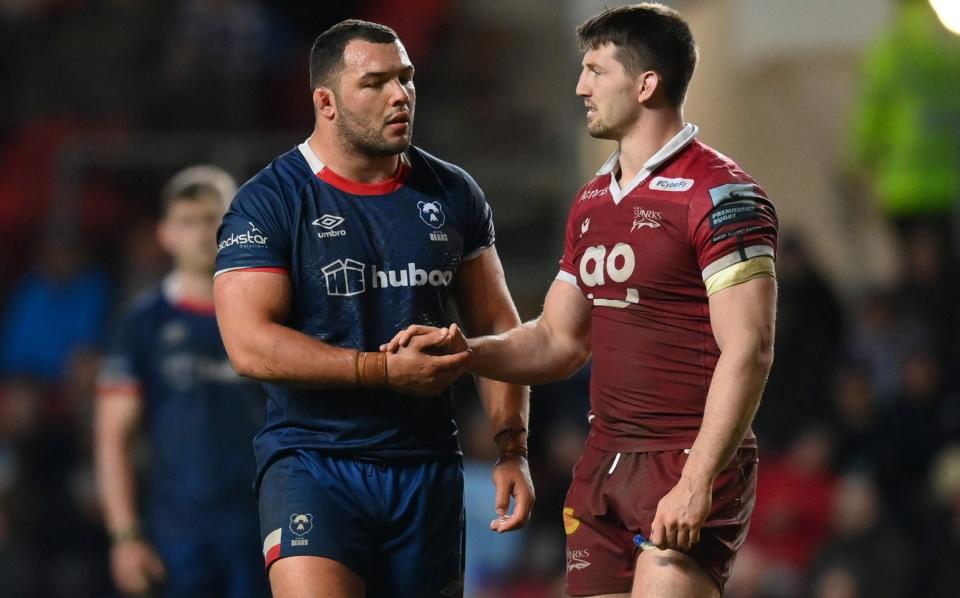On match day, in the concourse of a Premier League rugby ground, there are people waiting for the hailing commissioner to arrive – and he is late. Is this a foul worthy of a red card?
Given that the commissioner in question has been hospitable enough to grant Telegraph Sport exclusive access to the inner workings of the Premier League’s disciplinary processes, probably not. Moreover, it is the commissioner himself who decides.
With kick-off just over an hour away, I’m here to take a behind-the-scenes look at the role of quoting commissioners – about the only off-field subdivision of rugby officers who haven’t overseen the match day. last fourteen days.
These are 22 officials, all part-time employees of the Rugby Football Union, spread across the country, who are paid to watch Premiership, Championship and Premiership Women’s Rugby matches every weekend and anything untoward in a post-match report to bring under attention. Some are ex-players, some come from other unions – there is currently a Hungarian officer – and some also perform duties in European leagues, but they all have a keen eye for foul play.
“After my playing days, if I had a pound for every time someone said ‘poacher becomes gamekeeper’,” the commissioner, who arrived today, told Telegraph Sport. “There are a few ex-players. I absolutely love it. It keeps me involved at the top end of the game. I end up meeting a lot of friends.”
But before pleasantries among friends, business must begin. First stop, the television truck, where the commissioner hands over a USB stick to one of the broadcaster’s technicians. It is this stick and a soon-to-be-created WhatsApp group that the entire process revolves around. During today’s match, the referring commissioner will watch in the press portal together with the official timekeeper, and when he notices an incident that requires further attention, he will note the time in the match and where on the field the incident took place, and ask he asked the broadcaster’s technician to save all the angles as clips on his USB stick. Then the commissioner can make an informed judgment from the comfort of his own home on whether a player should be named.
As kick-off approaches, it’s time to meet and greet the respective team managers in the tunnel. A less experienced commissioner might have to introduce himself, but not this particular officer, who is seemingly known to everyone. “Hopefully they really like me!” says the officer, when I ask if they are just having fun because of his status as commissioner. “If I quote someone, maybe not.”
The commissioner reminds the two team managers that they can report any problems to him after the match. The deadline for referrals from clubs is twelve hours, while the commissioner is given a further twelve hours to cite. For a snapshot of how a commissioner’s duties have eased, this particular officer named just one player over the past two years; the last Premier League mention for an incident missed by pitch officials came almost a year ago (an Ellis Genge tackle on Tom Curry in April 2023).


“Hearing noises are not that common,” says the commissioner. “There are now so many different levels with the referees, the assistants and the TMO. To be honest, we are more of a safety net. The only other time is when the referees on the pitch decide something is a yellow card and we look at it and think, ‘Hmm, it’s a bit worse than that. It needs to be upgraded’. If it is immediately red, we will not participate, it will be handled automatically. All we have to do is sort the clips and send them to David [Barnes, RFU head of discipline] because they have to write a report. We only take action if it is a penalty or yellow that deserves red.
“It used to be gouging, punching; You name it, it continued. Now it’s high tackles, tip tackles. There are too many cameras to get away with anything else.
“I have been a quoting commissioner for ten years. Beforehand I was on the judicial panel. The citing officers sent the bad boys to us and then I was asked if I wanted to become a citing officer. I had just finished playing, so I took my chance.”
With the pre-match preparation complete, we ascend to the press portal. A packet of nuts and a bag of mint humbugs are enough for dinner and with the match in full swing, handbags are bursting out on the field. The commissioner’s attention is drawn and the binoculars are raised. “Nobody’s going to throw a punch,” he says, almost encouraging the players. “They know damn well they’re going to get in trouble!”
At the end of the first half, the commissioner scribbles “NFP” in his notebook: No foul play. If there had been, he explains, he would have waited until halftime to put them in the WhatsApp group. After all, his undiluted focus must be on the match as it happens.
“We have something called the ‘pink card test’,” he says. “We are looking for everything that can go from a yellow card to a red. That’s the easiest way to describe it.
“I write down every crime incident. You wouldn’t call it an intentional blow or a collapsed maul, but it is foul play. It’s about causing injury – which we do look at – and we look at the degree of danger. Deliberately knocking is not dangerous; The collapse of a maul could be possible, but is always not.
“High tackles and something else that has crept in, people attacking the lower extremities. Dissenting opinions… when a player tells the referee to ‘f— off’ you hope it’s dealt with there and then, but if it’s not then it’s under my jurisdiction.”
This isn’t a fun, jobs-for-the-boys affair either. Barnes told Telegraph Sport that accountability was one of the main reasons for paying their officers, although officer cuts are “very rare”.


“Often it’s not always about the decision, it’s more about offering a rational explanation of it,” says the former Bath propagandist. “Most are quite good and do exactly what we ask.
“And that works both ways. The quoting commissioners enjoy going to matches so we have kept their role personal, while World Rugby, for internationals, has quoting officials completely remote.
The commissioner added: “There is accountability – 100 percent. If you don’t do your job well and don’t pick things up, you either don’t get any matches or you drop down a level to the championship or women’s matches.
“If there is something controversial that you are not sure about, we discuss it in a WhatsApp group. We probably always sing from the same hymn sheet for about 90 percent.”
The song sheet for this match, just like during halftime, sings “NFP”. All that’s left is to check in with the two team managers – who have nothing to add this time – before swinging past the broadcast booth to retrieve that precious USB and heading off into the night, with 24 hours to make a post to submit. match report which – as always – will be quite bare.